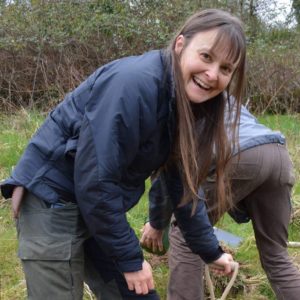Cases of the devastating bird disease, trichomonosis, have been seen in birds in Longdown, so here is a bit of background and what residents can do to help stop the spread. The parasite, (trichomonas gallinae) first emerged in the UK in about 2005, and is considered to have resulted in up to a 60% decline in greenfinches, but it also affects other finches, such as chaffinch, goldfinch and bull finch; as well as sparrows, siskins, blackbirds and dunnocks. The peak months for infection are June-September, but it can occur all year round.
Briefly, it can be transmitted via bird feeders and bird baths.
Signs of Disease
As well as lethargy and fluffed-up plumage, affected birds may drool saliva, regurgitate food, have difficulty in swallowing or show laboured breathing. Finches are frequently seen to have matted wet plumage around the face and beak. In some cases, swelling of the neck may be visible from a distance. The disease may progress over several days or even weeks, consequently affected birds are often very thin or emaciated.
Following these hygiene precautions will help avoid the risk of any infection transmitting and to help safeguard the birds in your garden against disease:
- Clean and disinfect feeders/ feeding sites regularly. Suitable disinfectants that can be used include a weak solution of domestic bleach (5% sodium hypochlorite). Always rinse thoroughly and air-dry feeders before re-use.
- Brushes and cleaning equipment for bird feeders, tables and baths should not be used for other purposes.
- Wear rubber gloves when cleaning feeders and thoroughly wash hands and forearms afterwards with soap and water, especially before eating or drinking. Avoid handling sick or dead birds directly. For instance, use disposable gloves or pick the bird up through an inverted plastic bag.
Control
Birds infected with finch trichomonosis have difficulty swallowing and often regurgitate seed or water. This potentially infectious material can then quickly be consumed by healthy birds, exposing them to infection. As feeding stations encourage birds to congregate, sometimes in large densities, they can thereby increase the potential for disease spread between individuals when outbreaks occur. This means that general cleaning and good hygiene alone will not be enough to prevent birds infecting each other at feeders or bird baths during an outbreak, and further precautions are necessary.
As such, if you see birds of any species that you suspect may be affected in your garden, it is recommended to take the following steps:
- Leaving bird baths empty until no further sightings of sick or dead wild birds occur.
- Temporarily stop feeding for a minimum of 2 to 4 weeks in order to encourage birds to disperse, thereby minimising the chances of new birds becoming infected at the feeding station.
- Only re-introduce feeding when you are no longer seeing birds with signs of ill health:
- Gradually reintroduce food to your bird tables and/or hanging feeders, whilst closely monitoring for further signs of ill health.
- It may also be advisable to avoid encouraging finches to congregate in large numbers and share food and water sources in the period following an outbreak when food is gradually being reintroduced. This may be achieved by offering a variety of food types, and limiting the volume of foods that attract large numbers of finches (e.g. limit the volume of mixed seed and sunflower seed hearts provided).
- If you see further birds with signs of ill health, once again stop feeding.
Prevention
Following best practice for feeding garden birds is recommended to help control and prevent transmission of disease at feeding stations all year round.
- Routine good hygiene on bird feeders.
- Provision of clean and fresh drinking water on a daily basis.
- Provision of fresh food from accredited sources.
- Rotate positions of feeders in the garden to avoid build-up of contamination in any one area
- Do not allow accumulations of seed to occur, for example on the ground below feeders, and particularly on surfaces that are damp and/or contaminated with faeces.

